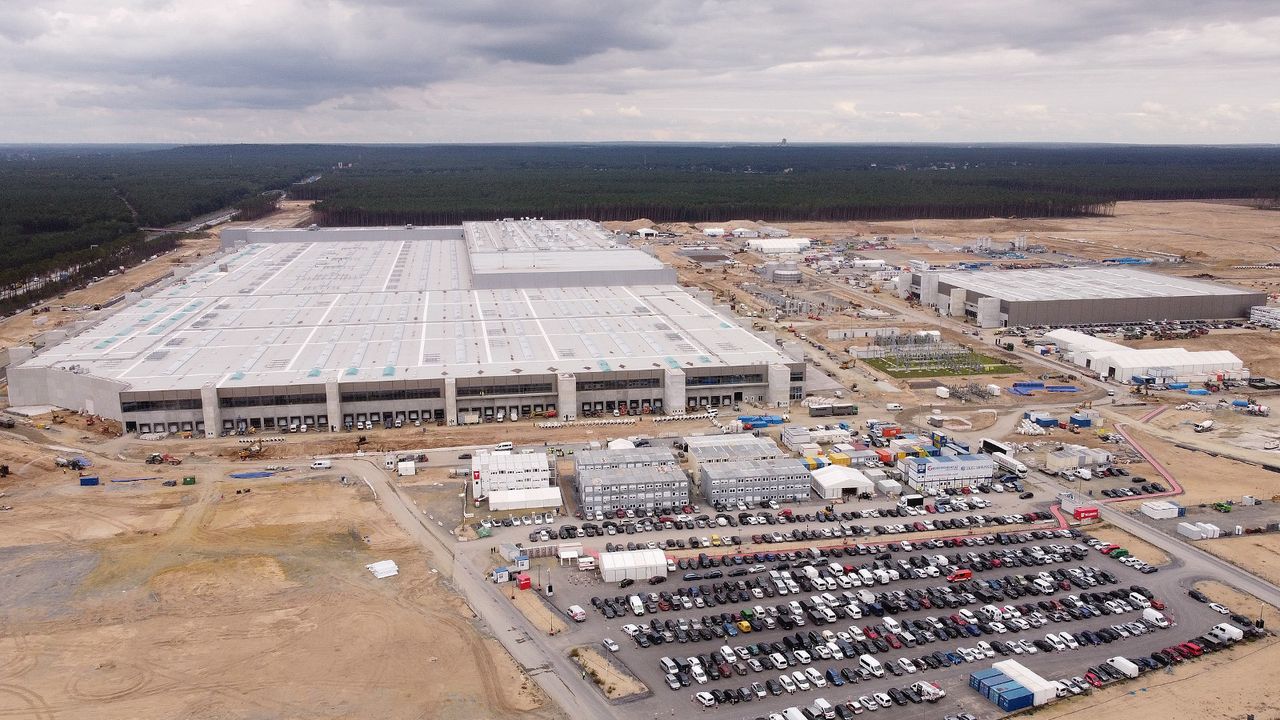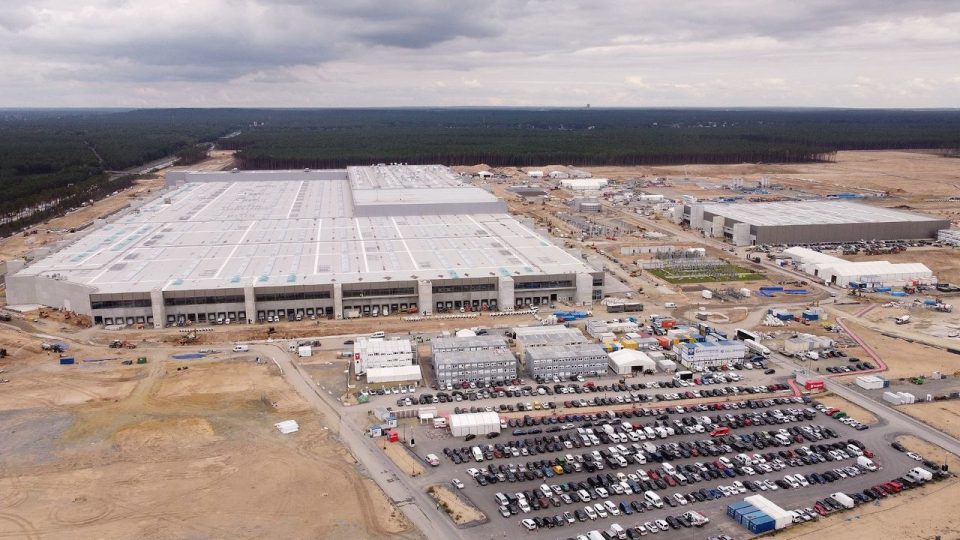
What transpired last week at the site of Tesla’s new electric car factory in Brandenburg, east of Berlin, can only be described as spectacle.
Tesla founder Elon Musk, the richest man in the world, personally handed over the first Brandenburg-produced vehicles to customers, who paid €70,000. Much like Helmut Kohl in his day, who promised “flourishing landscapes,” Social Democratic Party Chancellor Olaf Scholz declared at the event, “The East is ahead industrially.”
Economics Minister Robert Habeck, a member of the Green Party, described the US company as a role model for Germany. Tesla had chosen Germany, he said, because the company expected it to become the leading market for electromobility. That was also his goal, he said.
The fact that Tesla Gigafactory, which was built in record time, was largely constructed without a permit and under slave-like working conditions at the construction site, did not bother Habeck in the slightest.
On the contrary, he encouraged Germany’s corporate masters to proceed with the same ruthlessness. “This short period of factory construction can, of course, be something of a benchmark for the pace of work at Tesla in other areas as well,” Habeck said. “I’m working on it 24 hours a day, seven days a week.”
Visibly impressed by Musk’s unscrupulous methods, the economics minister indicated his notion of “green capitalism.” He declared, “If the permits hadn’t come, they would have had to take things down. It’s a different corporate daredevil culture—but it worked out.”
The laudatory remarks from the Federation of German Industries (BDI) sounded almost restrained in comparison. “The pace at Tesla must serve as a model for investment projects in Germany,” said BDI President Siegfried Russwurm.
All of the politicians present used the opening of the electric car plant as a welcome opportunity to promote Germany’s energy independence from Russia. Here, too, Habeck set the tone, saying, “We want to become independent of Russian oil. That is not trivial.” Referring to the Ukraine war, he added, “To show that we can not only replace oil with oil, but we can also do it electrically, is, of course, a nice symbol on this day.”
With so much official approval and enthusiasm, the IG-Metall union could, of course, not be absent. Birgit Dietze, IG Metall district manager for Berlin, Brandenburg and Saxony, sent the following message to Tesla: “On the occasion of the plant opening, I congratulate the Tesla company and its founder Elon Musk.” She added, “In Grünheide, employees are working on the drive technology of the 21st century as pioneers of electric mobility in a globally leading plant.”
The IG Metall bureaucrat’s gushing words knew no bounds. “In future, she declared, “anyone looking for the major automotive locations on a world map will come across the town of Grünheide in Brandenburg. With the opening of the Tesla factory, eastern Germany is strengthening its international pioneering role in electromobility.”
She concluded by saying that innovative strength and high productivity were an “important prerequisite for good working conditions and good wages in Germany.”
It remains to be seen how innovative and environmentally friendly electric cars really are. What is certain is that the auto companies are using the shift from gasoline-fuelled vehicles—often called a “transformation”—to cut costs, reduce staff and increase profits.
According to recent studies by the Ifo Institute, some 180,000 jobs will become surplus in Germany alone over the next three to four years. Even if 12,000 people are soon employed at the Gigafactory in Brandenburg, that will hardly outweigh the loss of hundreds of thousands of other jobs.
US corporations like Tesla and Amazon have shown in recent years what “innovation and high productivity” mean for workers. Work pressure and work tempo are drastically increased. Standard work hours, break regulations, social standards, relatively high wages, predominantly fixed contracts—things once fought for by workers and still prevalent in the German auto industry—hardly exist at Tesla and Amazon. The enthusiasm of the government, BDI and IG Metall for Tesla must be viewed in this context.
Musk’s Starlink supports war against Russia
In the context of the Ukraine war, other issues are raised that are directly related to Elon Musk.
Tesla, as well as German car companies, especially VW, are complaining about shortages of supplies and raw materials due to the war in Ukraine. It is not only supply bottlenecks for gas, coal or oil that the industry fears. Above all, nickel, central to battery production, and magnesium, the raw material for aluminium alloys, but also palladium for the construction of catalytic converters are needed in the automotive industry. The largest producers and suppliers of these raw materials are Russia and China.
Long before the war, there were pandemic and speculation-related supply shortages and price increases of up to 400 percent. The war and the massive sanctions against Russia are now leading to huge supply shortfalls. In a cross-industry survey by the Munich-based Ifo Institute, 89 percent of companies in the automotive industry cited problems with purchasing.
In this regard, it is noteworthy that Elon Musk is in the thick of the war against Russia, alongside NATO, the US and Europe. As Stern-Online recently reported, the Starlink satellite Internet network operated by Musk’s company SpaceX plays an important role in the war against Russia.
According to the report, truckloads of Starlink ground stations reached Ukraine at the very beginning of the war. Ukrainian Digital Minister Fedorov reportedly had asked Musk for them via Twitter. In particular, he said, the Aerorozvidka (aerial reconnaissance) unit, which uses drones to monitor and attack Russian tanks and positions, has benefited the Ukraine military. The unit uses Starlink to access strategic databases, contact control centres and provide artillery support.
“Once Aerorozvidka has identified Russian targets, soldiers pilot unmanned aerial vehicles with anti-tank munitions over them and drop the bombs—or relay the coordinates,” Stern-Online wrote.
A Ukrainian soldier reportedly confirmed the effectiveness of the attacks, saying, “At night, it’s impossible to see our drones. We specifically look for the most valuable truck in the convoy and then hit it accurately. We can do that very well and with very little collateral damage—it is possible even in villages.”
Workers must reject NATO’s war effort as strongly as they reject Russia’s war on Ukraine. NATO deliberately provoked the war by systematically encircling Russia. It is waging a proxy war in Ukraine, the goals of which are regime-change in Moscow, the break-up of Russia and unhindered access to the country’s valuable raw materials. To achieve this, it is risking nuclear war.
The German government is using the war as a pretext for the biggest arms build-up since Hitler. It is supplying weapons to the war zone and tripling its arms budget this year from €50 billion to €150 billion.
This can only be understood as a declaration of war on the working class, which must bear the costs. The danger of war can be fought only by the united resistance of the working class of Russia, Ukraine, Germany and worldwide.
The role of IG Metall
The implications for the German working class of the war against Russia and the unprecedented expansion of military spending will be all too clear at the Tesla plant in Grünheide. The workers who will soon be producing up to 500,000 electric cars a year will have to deal with an owner who will stop at nothing to maximize his company’s profits.
Earlier this year, when Tesla announced it would have a works council elected at the plant as early as February 28, 2022, this was immediately welcomed by IG Metall, which has long served as an advocate for the company’s interests in the auto industry.
However, IG Metall was unable to draw up its own candidate list because it simply did not have enough members in the plant. Now there is a works council, the majority of whose members are from the “Gigavoice” list. This list was set up and financed by Tesla itself, and its candidates all came from middle- and even upper-management levels, and called themselves managers, supervisors and superintendents.
According to information from two different sources, the result of the works council election probably looks as follows:
* 881 of 1,879 votes cast went to “Gigavoice,” which can thus provide 10 members of the presumably 19-member Gigafactory works council.
* 404 votes, and thus four seats, went to the “Giga4You” list.
* 340 votes and three seats went to the “Heart of Tesla” list.
* 196 votes and two seats went to the “Energy for the Future” list.
It can already be seen from the names of the three smaller lists that they are equally aligned with the profit interests of Tesla, even though they may have some “normal employees” in their ranks, which allows IG Metall to present them as an alternative.
Although the election result is tantamount to a slap in the face for IG Metall, Berlin District Manager Dietze welcomed the election. She said the automaker had taken the “first step in the co-determination landscape that has grown here.”
“The works council election had some problems, such as the early date, as the workforce is growing strongly and many positions were not yet filled, especially in production,” Dietze continued. “Nevertheless,” she said, “this first works council election at Tesla in Grünheide was a successful premiere.”
Now, she concluded, “the first step toward a culture of co-determination must be followed by others,” adding that IG Metall had “every interest in seeing this plant flourish and enjoy lasting success.”
The WSWS warned workers long before the Tesla factory opened and the works council was elected not to harbour any illusions about a works council, whatever its composition. Instead, it has called on Tesla workers to build independent rank-and-file action committees .
We wrote: “But the real question for the many thousands of production workers who will soon be toiling there is quite different: Is a works council with or without IG Metall participation even desirable? Why should the new workforce, which will very quickly come into conflict with Musk’s foul working conditions, voluntarily create a second adversary?”
And further: “The World Socialist Web Site and the Sozialistische Gleichheitspartei (Socialist Equality Party-SGP) oppose the formation of a works council at Tesla. A works council, whether under management control or under the direction of IG Metall, would not improve working conditions. On the contrary, wherever works councils and trade unions have influence, wages and working conditions have been significantly worsened in recent years.
“These bureaucratic apparatuses are there to control workers and suppress and divide their struggles. They strive to prevent them from becoming the starting point for a broader working class movement.
“Instead, we call on workers to build their own independent rank-and-file action committees at Tesla, democratically elected and controlled by the workers themselves. Such organizations are important for networking with fellow Tesla workers in the US and around the world to prepare for a common struggle.”
Stay informed. Sign up to our Autoworker Newsletter.


